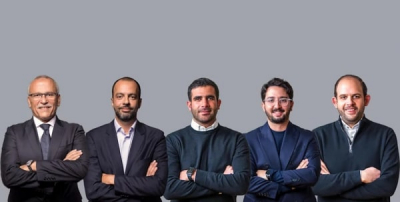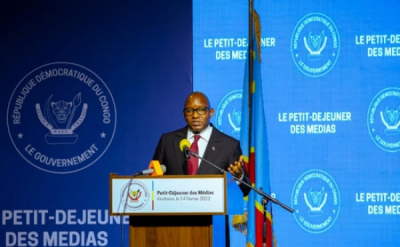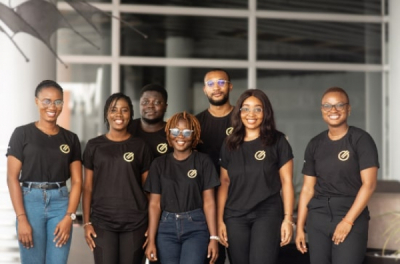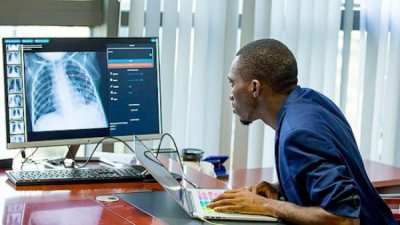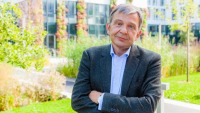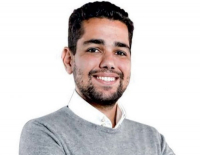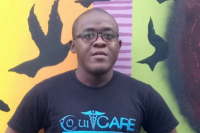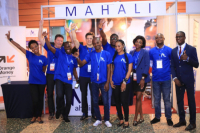Congolese entrepreneur Dana Endundo Ferreira (pictured) has developed an online platform that serves as a melting pot for art lovers across the world. The platform, Pavillon 54, is presented as the “go-to platform for discovering, buying, selling and understanding Modern and Contemporary African Art.”
She has long worked in the financial sector but said: “I wanted to do something I was passionate about and where I could best utilize my skills.” Dana Endundo Ferreira has a Master's in Business Administration obtained in 2012 from Columbia University in the US. She then went on to specialize in digital strategies and digital marketing in US companies. In 2018, she moved to the UK, where she worked as a consultant for a fintech with business aspirations in Africa. With her background, she decided to do something she was passionate about.
The daughter of two art lovers wanted to create the first leading platform dedicated to the development of Africa's arts and culture, by Africans, for Africans, and the world. To achieve such a feat, she adopted a 3C strategy (commercial, content & community). The commercial aspect naturally involves the various purchases of African works. She then intends to offer educational content to fill the information gap on African art with a well-researched blog and other resources; and finally, she organizes events that help create a strong community where African cultures are shared and celebrated. To date, some 40 renowned artists are listed on Pavilion 54, where they exhibit a variety of works ranging from paintings, photographs, and sculptures that sell for $1,000 to $10,000.
While the numbers are promising, Dana Endundo Ferreira deplores the lack of financial support and infrastructure for the arts in Africa, despite the industry's strong international potential. “We will also soon dedicate a space on our platform to present and offer more visibility to young artists who do not have formal representation in galleries or other exhibition opportunities, but demonstrate great talent and potential," she said.
Aïsha Moyouzame
Investment in African tech startups has gradually improved over the past five years. However, the tech industry on the continent has the potential to attract much more. In its "Supercharging Africa's Startups: The Continent's Path to Tech Excellence" study released February 15, the Tony Blair Institute for Global Change estimates that African startups could raise more than $90 billion by 2030. To do this, the institute suggests 10 steps to follow:
- Establish a public data-sharing platform for tech startups
- Develop innovative financing vehicles
- Unleash capital from institutional and corporate investors
- Create a single digital market by prioritizing implementation of the AfCFTA
- Generate demand for local tech solutions
- Implement legislation to support tech startups and seek their regular feedback
- Improve digital skills
- Strengthen digital infrastructure
- Boost the capability of startups and support organizations
- Launch a “pan-African Startup Network”
The document found that “pre-pandemic, 22% of the working-age population had set up their own businesses. However, cumbersome regulations, the digital-skills gap, limited funding, and fragmented markets mean that Africa accounts for just 0.2% of the value of global startups.”
Although investment in African tech startups is still low compared to other regions, it has still seen a sharp increase over the past four years. In its "Africa's Investment Report 2021," Briter Bridge revealed that the amount reached $4.9 billion in 2021, 243% higher than 2020.
The "Lions go digital: The Internet's transformative potential in Africa" report by the McKinsey Global Institute estimated that the digital economy would contribute $300 billion to Africa's GDP by 2025, providing much-needed jobs on a continent where there are three to four times more people entering the labor market than actual jobs created. A favorable ecosystem for startups in Africa could make them future job providers for the youth who are increasingly becoming fans of technology.
Muriel Edjo
Two years after securing its first seed funding, Wasla announced a larger equity investment to finance its expansion in Egypt and beyond.
Egyptian e-commerce platform Wasla has closed a $9 million equity financing from non-bank financial services provider Contact Financial Holding to expand its payment solutions. The company, co-founded in 2018 by two Rocket Internet alumni and investment banker Mahmoud El Said (pictured, right), plans to include "buy now and pay later" financing options, as well as online payment capabilities, to its current offering. The startup also wants to enter Nigeria, the largest economy and most populous country in Africa.
“It’s a huge market at the end of the day, you have roughly 250 million people. They’re very technologically advanced, and their adoption of e-commerce is quite good. It’s quite the right market. There’s all the infrastructure that you kind of need to set up a proper tech business. In terms of maturity within the tech ecosystem, Nigeria is probably one of the best markets in Africa, competing directly with Egypt, South Africa, and a couple of others,” said Mahmoud El Said.
In addition to financial support, Contact Financial Holding will bring its experience in the technology and consumer credit sectors to Wasla, enabling it to expand financing opportunities for its customers. In December 2021, Sherif Makhlouf, managing director of consulting firm Boost, reported that e-commerce transactions in Egypt reached the equivalent of $5 billion in 2021.
As a reminder, in December 2019, Wasla raised $1 million in seed funding to strengthen its working team and develop new financial products.
Chamberline Moko
Since coming into power in 2019, Felix Tshisekedi has made the digital sector a tool for growth in the DRC. The Digital sector has been used to support the various economic sectors and is now being used to restore the country's brand image at the national and international levels.
The various ministries, presidency departments, and other public institutions of the Democratic Republic of Congo now have a digital platform where they can officially communicate. The portal www.republique.cd was officially launched last February 14 by Prime Minister Jean-Michel Sama Lukonde Kyenge (pictured).
The new website will help harmonize government communication, authenticate information, and fight against fake news. It is touted as the "digital gateway" of the DRC. According to the Minister of Digital Affairs, Désiré Cashmir Eberande Kolongele, the platform will centralize all official information - meeting minutes, report publications, activity announcements, etc. – so that they are easily accessible to Internet users. Currently, DRC has more than fifty ministries, plus large administrative departments. Many of them do not have an Internet presence, which often makes it difficult to authenticate the information from them.
"I wanted to invite the various public administrations, starting obviously with the ministries, the services of the presidency, and other institutions to use this portal and bring reliable information. We aim to give people first-hand and true information through this portal," said the Minister of Digital Affairs.
The project is part of the sectoral digital policy adopted by the government when it was creating the dedicated ministry on April 26, 2021. One of the components of this policy is to build “the brand image of the Republic and ensure visibility at the international level.”
The government also plans to adopt a state brand through a common visual identity for all websites of ministries and public institutions. Twitter accounts will also be opened and certified for all government entities.
Adoni Conrad Quenum
Earnipay, which launched as a pilot last September, has already attracted the interest of investors. The fintech aims to reach nearly 200,000 employees with its flexible, on-demand payroll service by the end of 2022.
Earnipay, the Nigerian fintech that offers employees flexible and regular access to their salaries, has secured $4 million in pre-seed funding to accelerate its business in the country.
“Earnipay has quickly established itself with a product built specifically for the payroll behaviors of this region, and early employer uptake is very strong. Nonso (the MD, ed) has built one of the strongest teams that we’ve met on the entire continent, and we’re thrilled for the opportunity to partner with them,” said Brendan Dickinson, general partner at Canaan, the VC firm that led the deal.
After he faced employee departures due to the monthly payroll system instituted at his first-ever plastic waste recycling company, which launched in 2019 in Ghana, Nonso Onwuzulike decided to revamp that payment method by offering a more regular and flexible employee payroll system as part of a new business venture in Nigeria.
Earnipay, which was only launched on a trial basis last September, claims to have served employees of about 20 companies in Nigeria to date. Its app has been used more than 1,000 times. Confident in its growth prospects, Earnipay aims to offer its flexible, on-demand salary access service to at least 200,000 employees by the end of this year.
In Nigeria, salaries for employees in the formal sector are paid monthly, while those in the informal sector are paid daily, according to several local media. Short of cash between paychecks, employees have no other option than to borrow or to ask for an advance on their salary with sometimes high-interest rates. Earnipay's solution is therefore a relief for these employees.
Chamberline Moko
He is the founder of Insightiv, an AI and Teleradiology startup dedicated to improving medical imaging in Rwandan hospitals. The AI/ML engineer recently raised funds from the HealthTech Hub Africa and hopes to soon collaborate with Rwanda’s public health system.
In 2009, Audace Nakeshimana (picture) founded Insightiv, an AI and teleradiology startup. At the time, he was studying at the Massachusetts Institute of Technology (MIT) in the US. Besides being the founder and executive director of Insightiv, the Rwandan is also, since September 2020, a Machine Learning engineer at Apple. Setting up his business in Rwanda was motivated by the desire to involve local talent in technological development and his ambition to tackle African challenges.
Insightiv’s purpose is to provide easier access to medical imaging diagnostics. “Growing up, we heard stories about people who were sick and [didn’t] know what [they] had. Then that person [would come] home [and] they eventually die. It happens to a lot of people, especially in Africa - my grandma being one of them and actually one of my aunts. … If you really look at it, a lot of people die because of limited diagnostics,” Nakeshimana said.
Insightiv is developing advanced technology to help radiologists detect life-threatening diseases faster, by making medical imaging timely and accessible. The solution provides tools based on various image viewing modalities, giving medical imaging specialists access to a wide range of tools for better analysis. It allows them to create and submit reports using a single platform. As a cloud-based system, the Insightiv Diagnostics platform helps healthcare personnel focus on patient care rather than technical issues.
In 2020, Audace Nakeshimana was a finalist in the PKG Center's IDEAS Social Innovation Challenge, receiving $16,000 in funding. That same year, in December, he won the HealthTech Hub Africa competition and was awarded $30,000. The entrepreneur plans to use the funding to improve his service and reach out to legislators to collaborate with the public health system.
A decade from now, he plans to reach 10% of the Rwandan population with his rapid diagnostics solution.
"If you look today, the current health care system only has the capacity to diagnose about 200,000 to 300,000 patients [...] We think that if a private organization like Insightiv can take care of 10% of the population, that means we would be doing more than the national health care system is doing today. That's an ambitious, but realistic goal," the engineer claims.
Aïsha Moyouzame
Africans need good access to the internet to contribute to the digital economy. Well aware of this challenge, Orange has, over the past five years, increased its investments in network coverage on the continent.
Telecom group Orange and Sonatel, its Senegalese subsidiary, announced on February 16, 2022, their partnership with the Luxembourg-based satellite telecom services provider SES to expand broadband connectivity in Africa. In this framework, Orange and Sonatel will deploy and manage SES' O3b mPower gateway on the continent. O3b mPower, a next-generation medium earth orbit satellite communications system, will be deployed in Senegal at Sonatel's teleport site in Gandoul, and other local satellite sites.
Jean-Luc Vuillemin (photo), director of international networks at Orange, explained that the partnership with SES stems from Orange’s conviction that “satellite remains a technology of the future and that the recent innovations it has been experiencing will surely reinforce its position in the telecommunications industry, in Africa but also other regions with more developed infrastructure like Europe or North America.”
Demand for high-speed internet in Africa has gone up significantly since 2020. This demand was mainly driven by the Covid-19 pandemic which sped up the digitization of several services, as well as changed data consumption habits. However, despite a greater demand, the network coverage in Africa is still low - in rural areas especially. In 2021, the penetration rate for mobile Internet on the continent was 28%, according to the GSMA. The latter also reports that 206 million sub-Saharan Africans have no access to a mobile network; this is out of a population of 1,084 million in the region.
For Jean-Luc Vuillemin, the collaboration with SES “will play a key role in Orange’s mission to build intelligent and open networks that will help make digital technologies more accessible and used by as many people as possible.”
Adoni Conrad Quenum
Launched only one year ago, this startup has already established a large network of more than 10,000 grocers, to whom it offers discounts on major brand products. Its goal is to expand its network over the next few years.
WafR is a Moroccan startup that helps buyers and grocers get discounts on products from department stores and supermarkets. Currently, over 10,000 grocers are part of the startup’s customer network - a number it seeks to increase to 50,000 a few years from now.
To meet its ambitions, WafR recently raised 3.5 million dirhams ($374,000). While disclosing the news on February 16, 2022, the startup said the operation’s proceeds would mostly be used to expand its network of grocers, speeding up its growth as well in the process.
“After the 300,000 dirhams commitment we first secured, many other investors showed interest in WafR and joined the funding round. As a result, we raised 3.5 million dirhams and our valuation reached 30 million dirhams,” commented Ismail Bargach (photo), WafR's co-founder, after the fundraising.
According to WafR’s estimates, in Morocco, grocery stores capture 85% of sales while department stores and supermarkets get the remaining 15%. To balance these statistics is the startup’s main mission: encourage more grocers to turn to the products of department stores and supermarkets.
Chamberline Moko
Cameroonian Emmanuel Assom’s (pictured) desire to migrate to Europe, nearly eight years ago, is now only a memory. The entrepreneur gave up on this dream to launch a healthcare solution that is already well adopted in his country. The health tech solution OuiCare was launched nearly six years ago. The promoter claimed that by the end of 2021, his solution had registered 3,000 customers, out of more than 20,000 users.
He developed OuiCare, basically as an e-health booklet, to replace the paper booklet and allow patients to always have their medical records available on smartphones or computers. This way, patients can be received in a health facility regardless of the city or country they are visiting. This idea came to him after his father died at a health center where he had gone without his medical records. Emmanuel says the doctors could have acted more quickly if they had had access to the file.
Before OuiCare was born, the entrepreneur, who studied computer maintenance, was a cleaner at a local company and a computer troubleshooter. At that time, he gathered enough money and moved to Europe where he started a business with some friends. In 2016, they founded ASTA (Advanced and Suitable Technologies for Africa), a web and mobile app development company for businesses and individuals. He later on created OuiCare.
Today, after several improvements, OuiCare is now composed of two platforms. The first, for patients, allows them to access doctors, teleconsultation, and their medical data. The second, for doctors only, allows them to monitor patients and manage their treatment. The startup, based in Yaoundé and Douala, is working to integrate other features such as the geolocation of pharmacies.
In 2021, Emmanuel Assom won the Orange Prize for Social Entrepreneur in Africa and the Middle East (POESAM). The healthtech company received €25,000 and support from local incubator ActivSpaces and French Bond'innov. OuiCare has also joined the Cameroon digital innovation center (CDIC), the new incubator launched on February 8, 2022, by the government. With some thirty doctors already registered, the startup hopes to extend its services to all regions of Cameroon and then to other African countries, such as Senegal, where administrative procedures have already been initiated.
Ruben Tchounyabe
In 2019, Alexis Bafcop and Géraud Lacaze, two Orange engineers, launched a solution in Abidjan, Côte d’Ivoire, to effectively meet the growing demand for online shopping delivery.
Named Mahali, the solution was presented during the 3rd edition of the Abidjan e-commerce Days in December 2019. It is a mobile geo-tracking app that allows a seller and a buyer to agree on a geolocated point of delivery, in a country where addressing is still weak. The tool integrates a database of locations fed in part by users themselves, who can fill in their address by indicating the city, the neighborhood, and landmarks with photos. The delivery man receives a code that, once registered on Mahali, allows him to access the necessary information and to propose a delivery time to the buyer. The solution enables buyers to pay via mobile.
"The team studied how people locate and describe a place in the region. We interviewed people in e-commerce warehouses, deliverymen, buyers, startup creators, etc., to understand the reality and the challenges they face," says Alexis Bafcop. The addresses created in Mahali can also be shared for other purposes, such as emergency services or to direct visitors.
The project benefited from the support and guidance of Orange's intrapreneurship body -Intrapreneurs Studio. Mahali also relies on the expertise of Orange entities such as Orange Labs Services, XDLAB (UX design), and receives great support from Orange Côte d'Ivoire teams: Orange Money, Enterprise Services, Customer Test Center and data scientists.
A year ago, Alexis Bafcop explained that "users are the ones who create the value of the app. So it's free. The more the delivery landmarks are used, the more reliable they will be. In two years, when the database is sufficiently reliable and complete, merchants will be the most likely to pay for the service.” The app will soon be launched in other countries including Senegal and Cameroon, the founders said.
Ruben Tchounyabe
More...
Achieving a digital economy is a priority in the New National Development Plan (NDP) 2021-2025, unveiled in December 2021 by President Muhammadu Buhari. Several international partners expressed intentions to support the project.
The European Union has announced an investment of €820 million to support Nigeria’s digital transformation over the next three years. The information was unveiled on Saturday, February 12 in Lagos by an adviser to the Executive Vice President of the European Commission, Alejandro Cainzos. This was during a roundtable discussion with Nigerian youth organized at the Tony Elumelu Foundation.
“The EU will support building the fiber optic cables and data centers needed to improve Nigerian’s access to high-speed connectivity. The European Investment Bank (EIB) will invest €100 million to expand secure 4G connectivity in Lagos and Ogun States and triple the national data capability,” said Alejandro Cainzos.
He said the EU will also support the digitization of the Nigerian administration to enable citizens to benefit from better and more easily accessible public services. €250 million will be invested to strengthen Nigeria's digital identity infrastructure with the highest data protection standards and support the creation and scaling of tech startups and stimulate innovative solutions for Nigeria's society and economy.
The EU will help develop regulatory frameworks with the highest standards of privacy, security, and cybersecurity, while promoting an open Internet and a digital market that respects citizens' rights, Alejandro Cainzos said.
The EU investment in Nigeria came two days after the organization announced an investment of more than €150 billion in Africa over the next five years. European Commission President Ursula von der Leyen was in Dakar on Thursday, February 10, just days before the European Union-African Union summit to be held on February 17-18 in Brussels, Belgium.
Last year, the Nigerian government unveiled a new National Development Plan 2021-2025 which places digital technology at the heart of many growth issues.
Muriel Edjo
Less than a year after it raised $170 million, Flutterwave announced the completion of a Series D financing round, making it the highest valued African startup.
Nigerian payment processor Flutterwave announced it has raised $250 million in a Series D round to implement its expansion strategy. The company says it wants to attract new customers in its operating markets in sub-Saharan and North Africa, and continue its growth through mergers and acquisitions, and partnerships.
Flutterwave also plans to develop new innovative products after the series of services launched in 2021, such as the online market Flutterwave Market and the money transfer platform Send.
“We are delighted that investors believe in us and our story and are committing their resources to this belief. This latest funding demonstrates the conviction of some of the world’s leading investors in both our business model, team, and the Africa technology market. It gives Flutterwave the much-needed support to deliver on our plans to provide the best experience for our merchants and customers around the world,” commented Olugbenga Agboola, CEO of Flutterwave, following the fundraising.
Before this recent investment, Flutterwave had raised $170 million in Series C funding in March 2021, becoming an African unicorn, the third in the financial sector. From 2016 to 2020, Flutterwave claims to have processed more than 200 million transactions worth over $16 billion in 34 African countries. The fintech also says it has tripled its customer base to 900,000 businesses worldwide. Its valuation has more than tripled since its last funding round in March 2021.
Fintech companies remain the most funded, and African tech continues to grow with over $5 billion in funds raised in 2021, according to Sherif Makhlouf, Managing Director of consulting firm Boost.
Chamberline Moko
Mobile phones represent a key asset for African countries to accelerate their digital economies. However, a barrier to this goal is the high cost of the devices. To improve mobile penetration rate across its territory, the Algerian government announced last Feb. 13 it has approved "the abolition of all taxes and duties on e-commerce, mobile phones, computer equipment for personal use and startups." The measure is provided for in the 2022 finance law approved in December 2021.
By removing the tax on e-commerce, the government facilitates online transactions, especially for individuals who have become accustomed to buying tech devices abroad. For innovators and startup promoters, this is an opportunity to easily acquire technical equipment. In the Finance Act 2022, a cumulative rate of duties and taxes of 133.05% was applied for the purchase of smartphones and tablets, 60.22% for hard drives. This makes the tax more expensive than the actual imported device.
The tax removal measure came after weeks of protests by Algerians, who kicked off an online campaign using the hashtag #khelini_nechri (let me buy). During the 6th edition of the Forum "Rakmana," held on January 19 in Algiers, the Algerian Group of Digital Actors (GAAN) had also denounced these taxes that "go against the general interest."
According to the Alliance for Affordable Internet and the Global System Operators' Association (GSMA), the high cost of smartphones is one of the main barriers to mobile Internet penetration in Africa, where the rate was only 28% in 2020.
Muriel Edjo
South African Stitch announced it has obtained additional financing worth $21 million to support its expansion strategy. The startup, which develops digital financial solutions primarily for fintech companies, says it will invest the money in developing new services, growing its human resources, and strengthening its footprint in South Africa and Nigeria, where it operates. Stitch also plans to enter new markets including Ghana, Kenya, and Egypt with its low-cost, less fraud-prone solutions.
"We are super excited for the challenge ahead and grateful to be supported by some of the leading fintech investors, founders, and builders in the world,” the beneficiary startup said on LinkedIn. The resources are provided by a consortium of mostly foreign investors, some of whom had invested in Stitch in the past. These include The Spruce House Investment, PayPal Ventures, CRE Venture Capital, and Village Global, all of which are based in the United States.
As a reminder, in February 2021, the company secured $4 million to improve its offers and expand its team. Stitch launched in Nigeria in October 2021 to tap into the opportunities in the country. According to Kiaan Pillay (pictured), CEO of Stitch, Nigeria is not only one of the most populous countries in the world, but also one of the densest and most dynamic fintech ecosystems. “It is fast becoming a hub for engineering and product talent and a go-to-market for fintechs," he said when his company started operations in Nigeria.
In an article published in October 2021, Stitch noted that underinvestment in developer training and infrastructure has hampered the rapid growth of a fintech ecosystem in Africa. Yet, the continent has advantages (rising smartphone ownership and digital literacy) that could unlock the potential of this market.
Chamberline Moko




